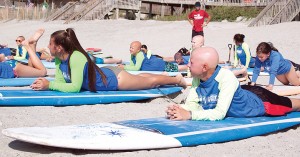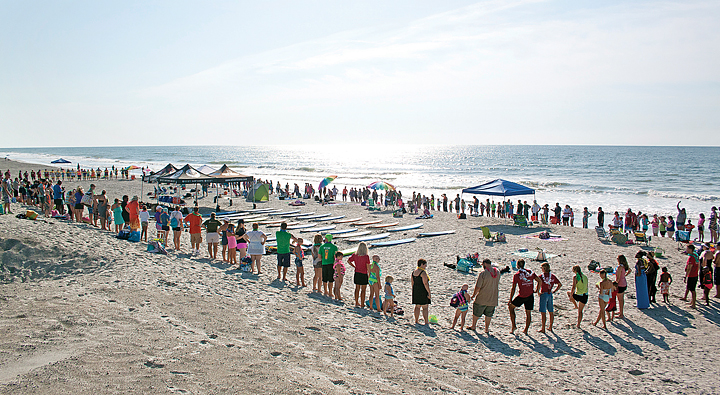Two sisters walk side by side through the beach sand Friday, Aug. 14, faces still glowing with surf stoke. Elli Goldfrad’s brown ponytail drips with saltwater. Adi Goldfrad, like most of the other surfers in the water, is bald.
“I’m different back home, because there aren’t a lot of people without hair where I live,” Adi said.
“But here,” Elli added, nudging her little sister’s arm, “I’m the one who’s different.”
The sisters traveled from New Jersey to Topsail Beach with their parents to take part in Alopeciapalooza, a four-day camp held for those affected by alopecia areata, Thursday, Aug. 13 through Sunday, Aug. 16.
The condition, which can manifest at any age, causes the body’s immune system to attack hair follicles. The 145 million people affected worldwide have varying degrees of hair loss.
“No one’s sick, it’s not contagious, there’s no pain, there’s no treatments,” said Jeff Woytovich, who founded the camp and the Children’s Alopecia Project nonprofit in 2004 after his daughter, Maddie, was diagnosed. “But it’s emotionally devastating. Some of these kids are made fun of by their friends. They’re bullied by the school and by teachers. Adults are staring at them and pointing.”

Steven Goldfrad, Adi and Elli’s father, said 10-year-old Adi wears a hat back home to hide not just her head but also her face, because she is self-conscious about her lack of eyelashes and eyebrows. She lost her hair four years ago, and still has moments of insecurity.
“She’s got to get there, day by day,” he said. “It’s a challenge.”
Each annual Alopeciapalooza helps boost her confidence, because she is surrounded by people of all ages who are similarly affected.
“All year, she looks forward to it,” he said. “She says, ‘I’m going back to my people.’”
The campers and their families, who travel from around the country to participate, immediately bond and develop enduring friendships, Woytovich said. That includes the adults, which this year included former Miss Delaware Kayla Martell and American Ninja Warrior finalist Kevin Bull.
“I love that show,” Adi said, scanning the ocean to spot Bull out in the surf. “I was screaming for him when he was on it. He and Rick are my idols.”
Rick Civelli, founder of WB Surf Camp, organized Friday’s Aloha for Alopecia event, a day of surfing for the campers. He brought his staff of instructors to Topsail Beach to push the kids into waves on boogie boards and foam surfboards.
Civelli said those with alopecia don’t typically play in the ocean because they hide their condition with clothing and head wear. When he was diagnosed at age 17, his love of surfing motivated him to become more comfortable with his condition. Paddling out with his friends and trying to catch an epic swell overcame his reluctance to take his hat off.
“Surfing gave me my life back,” he said.
Woytovich noticed a young boy in the ocean trying to surf with his baseball hat on.
“He can’t get on the board because he keeps grabbing his hat,” Woytovich said, “but I’m confident that he’s going to take that hat off somewhere between now and Sunday.”
While many campers found freedom and confidence in the surf, the experience was no less valuable to those who stayed on shore.
Two small boys, 7-year-old Kirk Nigbor from Gastonia, N.C., and 6-year-old Orson Hicks from Tahlequah, Okla., sat in the sand, heads bent in concentration over a shovel and a pail. It was the first time either had met another child with alopecia, said the boys’ mothers, who stood nearby comparing stories about raising a child with the condition.
Kirk’s mother, Heather Hodde, admitted it is hard to know how to handle the extra attention he receives, whether it is from other children pointing and staring or adults buying him toys because they think he has cancer. Both mothers agreed such situations frequently lead to conversations about what alopecia is, because so few people know.
Hodde said Kirk takes a direct approach to addressing his condition.
“He says, ‘I have alopecia areata. I’m allergic to my hair. Wanna play?’ And then it’s no big deal,” Hodde said.
Woytovich said creating an environment where alopecia is no big deal is the purpose of his camp, because it raises the children’s self-esteem by allowing them to be seen for who they are and not what they look like. There’s no talk of fundraising for alopecia treatments, he said, and the only healing mentioned is the spiritual kind that occurs in the ocean.
“Yes, they look different,” he said. “But everybody looks different.”
Steven Goldfrad added, “I want my daughter [Adi] to know we’re not searching for a cure because there’s nothing wrong.”
email [email protected]




